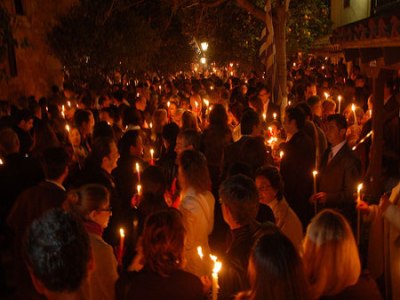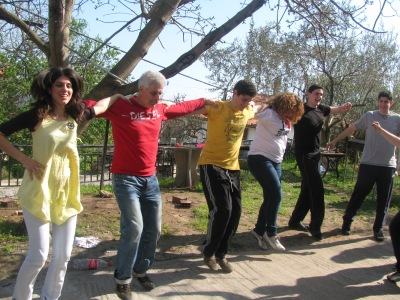 In Greece the liturgies of lent and especially of the week before Easter are known as the “divine drama,” in Greek theodrama. This may refer to the “drama” of the capture, crucifixion, and resurrection of Jesus and to the suffering of God the Father and Mary.
In Greece the liturgies of lent and especially of the week before Easter are known as the “divine drama,” in Greek theodrama. This may refer to the “drama” of the capture, crucifixion, and resurrection of Jesus and to the suffering of God the Father and Mary.
However, it is important to recall that the drama in ancient Greece referred to both the tragedies and comedies, most specifically, those that were performed in the theater of Dionysios in Athens. While we have been taught that the Greek tragedies celebrated “downfall of the hero” due to his “tragic flaw,” it is important to remember that Dionysios was the original protagonist of the Greek tragedy: it was his death and rebirth that was first celebrated.
Some have argued that the Greek tragedies should never be “read” alone, for they were always “performed” in tandem with the comedies, which were followed by the bawdy phallic humor of the satyr plays. The tragedies end in death and irreparable loss. But if the comedies and satyr plays are considered an integral part of the cycle, death is followed by the resurgence of life.
In response to Kelly Brown Douglas’s eloquent “reading” of the Easter story as a triumph of good over evil, I responded that here in Greece, the focus is death and life, not justice and injustice. I was not challenging Brown Douglas’s interpretation of the Easter story which is deeply rooted in Black churches, but rather pointing out that there are multiple readings of its meaning.
Theologically, the Greek Orthodox Church has interpreted the Easter story as a triumph over death. Though the whole story is told, the focus is not on the suffering of Jesus on the cross, but rather on the fact of his death. On Megali Paraskevi (Great Friday) the icon of Jesus is removed from the cross and placed in a “coffin” (tafos) that has been lovingly decorated with spring wild flowers the night before. On Friday night the coffin with its temple-crown (the epi-tafios) is carried through the streets while the people sing mournful songs.
One of my Greek friends once told me that for her the Friday ceremonies are the high point of the Easter celebrations. I was puzzled by this because I had always understood the resurrection of Jesus, celebrated by the lighting of candles on Saturday night at the stroke of midnight, to be the “main point.”
But what if we read the Friday night rituals as the “main point”? The meaning of the Easter drama would not so much be the “triumph” of the resurrection, but rather the enactment of the universality of death and the re-enactment of the suffering of those who have lost loved ones—children, husbands, wives, brothers, sisters, and friends–to death.
When we suffer a personal loss, we often feel alone. While almost everyone knows or will know what it is to lose a mother, no one can know what “I” feel and will continue to feel about losing “my” mother.
Perhaps one of the functions of the “theodrama” is to remind us that no one—not even divine figures—is exempt from the suffering caused by death. We may feel alone when a particular loved one dies, but in fact only those who die very young will not lose someone they love to death.
In the “theodrama” of the Orthodox liturgy, the four Fridays preceeding “Great Friday” are dedicated to the “Saying Good-bye” of Mary to her son. These liturgies are particular favorites of women, most probably because the grief of Mary mirrors their own. In fact, these four “lesser” Fridays can be understood to be a concession Christianity made to the Greater and Lesser mysteries of Eleusis which centered on Demeter and her loss of her beloved daughter.
Aristotle wrote that the purpose of the Greek tragedy was the “purgation of pity and fear.” The word he used was “catharsis” which is also the word used when referring to taking a “cathartic” to “purge” a poison from the body. Scholars are puzzled by Aristotle’s graphic and bodily choice of words, which is one of the reasons I remember them.
Two of the rituals of Easter in Greece are fasting and spring cleaning. What are these if not rituals of “purgation”? Those who refrain from eating meat during lent and finally from fish and milk products are purging their bodies of many “poisons” that have been built up from excessive consumption during winter feasts. Likewise, spring cleaning “purges” the house of built up dust and grime, as well as of the remains of food products that may have “gone off” during the year.
Putting all of this together suggests that one purpose of the Easter rituals is to purge the body of the pity and fear caused by the experience of death. The death rituals of Easter provide the opportunity to re-live individual suffering in community with others. What can be “purged” in this process is isolation and the additional suffering caused by asking “why did this happen to me?” The rituals of death and rebirth in spring remind us that the suffering caused by death is shared, not only by the other women who come together for the lesser Friday rituals, but by the whole community which takes part together in the rituals of Great Friday.
The “theodrama” of Easter like the rituals of Eleusis tells us is that no one is exempt from the suffering caused by death–not the divine Mother, not the divine Father, and not the divine Child.
There is great consolation in learning again that death and suffering are universal. This in turn opens us to the possibility that rebirth and regeneration are also universal. Which of course is why the “telos” or “end” of the Easter rituals is a communal feast, traditionally celebrated out of doors, with singing and dancing, in the company of spring flowers and the singing of birds.
Perhaps the real lesson of Greek Easter is not once and for all triumph over death, but rather celebration of the interconnected cycles of birth, death, and regeneration, which go back to the beginning of time.
PS At one time my sense of these underlying themes led me to participate in the Easter rituals of the Greek church. However, this enthusiasm has faded over time, especially now that I understand more of the words of the liturgy. I do still enjoy the out-of-church parts of the rituals and I do still visit shrine churches to light candles.
Carol P. Christ is looking forward to the spring Goddess Pilgrimage to Crete which she leads through Ariadne Institute—space is still available on the spring tour. Carol can be heard in a recent interview on Voices of Women. Carol is a founding mother in feminism and religion and women’s spirituality. Her books include She Who Changes and Rebirth of the Goddess and the widely-used anthologies Womanspirit Rising and Weaving the Visions.





Thanks, Carol, for your courage, and your motherliness, in taking on this very sensitive topic. There is an interesting book, titled LIFE AFTER LIFE, by Raymond Moody, comprised of a collection of interviews with people who have had NDE’s, that is, near death experiences — and, having passed over, or about to, found themselves returning to the body. There are consistent elements in those NDE’s which help to establish a strong possibility for a soul or spirit-energy housed in the body and released at death. Zen enlightenment is considered an OBE, an out of body experience also, and in that sense similar to an NDE. Emily Dickinson had some sort of enlightenment or realization experience when she was a child and which probably was the key to that amazingly profound awareness so present in her nature poetry. At the mere age of 20, writing to a young friend named Abiah, Dickinson shares the following:
“I do not care for the body, I love the timid soul, the blushing, shrinking soul. […] We are very small, Abiah — I think we grow still smaller — this tiny, insect life the portal to another; it seems strange — strange indeed. I’m afraid we are all unworthy, yet we shall ‘enter in.'”
LikeLike
Wow! I really like your interpretation here. Sharing the loss due to death in a communal setting sounds so…healthy!
What were the liturgical words that dimmed your enthusiasm for the formalized/institutionalized contribution to the ritual?
LikeLike
Oh you know the ones about the father, son, and holy spirit, the male priesthood, etc.
LikeLike
Thanks for your post, Carol. It’s very timely for me, since for the past few weeks I’ve been on an emotional roller-coaster caused by breast cancer surgery (prognosis very positive, stage 1, but still… my mortality has been right in my face). Your essay convinces me of the need to find some sort of community at this time to deal with the multiple emotions that are part and parcel of this for me. There are several available to me.
LikeLike
Your sisters here at FAR including me will be hoping for the best for you. Take care.
LikeLike
Carol, thank you for another thoughtful post. I especially liked the way you connected the Friday services leading up to Good Friday with the mysteries of Eleusis. As a boy, I always attended those services because my father sang a beautiful solo hymn about the grief of losing a child. It was hauntingly beautiful. Demeter lost her daughter. Mary lost her son. Sadly my dad lost his son at the age of 29, and 3 months later I lost my dad. Though 24 years have passed, I can still hear his voice echoing through the nearly empty church.
LikeLike
Nick, when my mother died I asked a much older friend it she still thought about her mother who had died many years previously. “Every day,” was her answer. I think of my mother often, very often, though it is over 20 years. She and her mother are one of the reasons I had friends over for an easter feast in the garden yesterday and one of the reasons I have a garden and love to care for it.
LikeLike